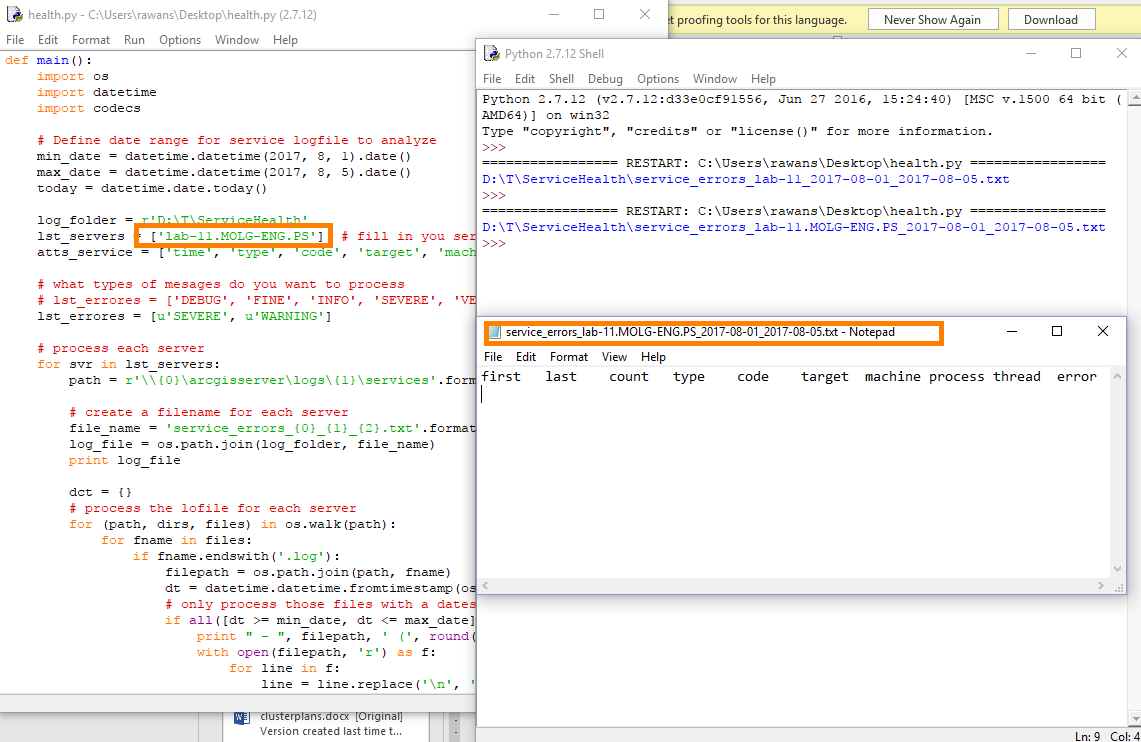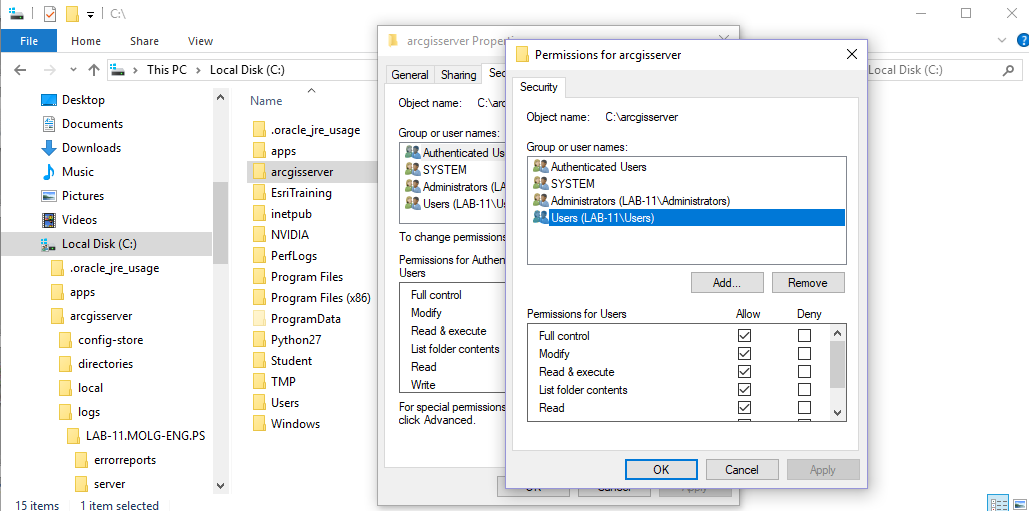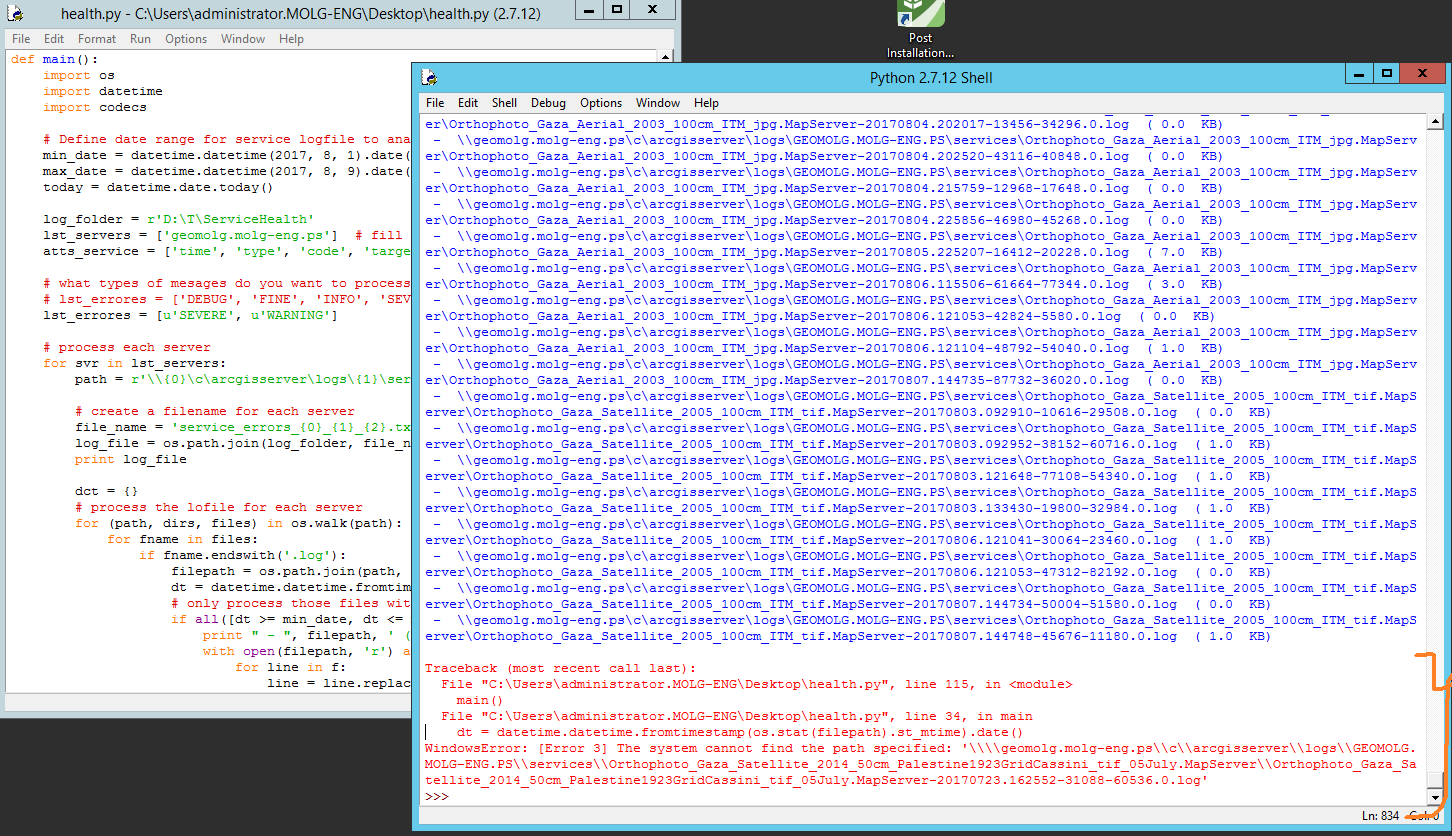- Home
- :
- All Communities
- :
- Products
- :
- ArcGIS Enterprise
- :
- ArcGIS Enterprise Questions
- :
- A method to check how our services are healthy
- Subscribe to RSS Feed
- Mark Topic as New
- Mark Topic as Read
- Float this Topic for Current User
- Bookmark
- Subscribe
- Mute
- Printer Friendly Page
A method to check how our services are healthy
- Mark as New
- Bookmark
- Subscribe
- Mute
- Subscribe to RSS Feed
- Permalink
I couldn’t figure out if there is a method to check how our services are healthy.
For example, I need a tool to send a notification for me if one of my services are stopped suddenly or any failure happened to my services.
I need any method to make a periodic check on my services.
Any suggestion for that?
Best,
Rawan
- Mark as New
- Bookmark
- Subscribe
- Mute
- Subscribe to RSS Feed
- Permalink
The path you show in your screenshot:
...\arcgisserver\logs\GEOMOLG.MOLG-ENG.PS\services
.. does not match the one I was asking for, and which created from the "geomolg.ps" setting:
\\geomolg.ps\arcgisserver\logs\GEOMOLG.PS\services
Does the path that is created in the script match to the path where the log files are stored?
- Mark as New
- Bookmark
- Subscribe
- Mute
- Subscribe to RSS Feed
- Permalink
Dear xander,
I tried it with using the same path but with the same result, and I made sure that the script have an access to that folder (I shared that folder and give the user full control on it).


Best,
Rawan
- Mark as New
- Bookmark
- Subscribe
- Mute
- Subscribe to RSS Feed
- Permalink
So, the folder below exists and is accessible by the script:
\\lab-11.MOLG-ENG.PS\arcgisserver\logs\lab-11.MOLG-ENG.PS\services
Additionally:
- The folder contains subfolders with service names and those contain log files
- There are logfile with a date between 2017-08-01 and 2017-08-05 (see line 7 and 8 of the original script)
- There are error messages in the logfile of type 'SEVERE' or 'WARNING' (see line 16 and 17 of the original script)
If not, please adjust the settings in the script.
- Mark as New
- Bookmark
- Subscribe
- Mute
- Subscribe to RSS Feed
- Permalink
Dear xander,
I edit the link and it’s working fine with me on lab 11 server, but I tried it on another service and when the script is running the following error appear on one of the services and the script stopped. What might be the problem with this service?

Best,
Rawan
- Mark as New
- Bookmark
- Subscribe
- Mute
- Subscribe to RSS Feed
- Permalink
I think the length of the path is kicking in here. If it is larger than 256 characters, you will get problems due to windows restrictions
Naming Files, Paths, and Namespaces (Windows)
You could as a test, copy the log files to a shorter path and run the script on that folder to get the results.
- Mark as New
- Bookmark
- Subscribe
- Mute
- Subscribe to RSS Feed
- Permalink
Thank you xnader, it’s working fine now.
I think this will be useful if we can run it automatically and link it with email to send an email when an error appeared in my server. Anyway thank you very much for your help.
Best,
Rawan
- Mark as New
- Bookmark
- Subscribe
- Mute
- Subscribe to RSS Feed
- Permalink
You can run the script automatically using the instructions here: Scheduling a Python script to run at prescribed times—Help | ArcGIS Desktop
To send an email, you would have to detect if an error occurred and use this post by jskinner-esristaff to get an idea of how to send an email: Send Email When a Feature is Added to an ArcGIS Online Hosted Feature Service
- Mark as New
- Bookmark
- Subscribe
- Mute
- Subscribe to RSS Feed
- Permalink
Thanks for sharing this python Xander.
I'm wondering if there is a way to create a toolbox for this code so that one can provide the inputs more decently (dates, log folder, server name...)?
what do you think?
Best,
Alaa
- Mark as New
- Bookmark
- Subscribe
- Mute
- Subscribe to RSS Feed
- Permalink
I guess the script could be turned into a GP tool. What would you like to turn into a parameter? What things should the end user be able to specify before running the tool?
- Mark as New
- Bookmark
- Subscribe
- Mute
- Subscribe to RSS Feed
- Permalink
And here an example of crawling through the service folders. Haven't used it for a while...:
import json
import urllib2
def main():
import codecs
import sys
import datetime
import os
# edit these settings
log_folder = r'C:\GeoNet\ServiceHealth\txt'
dct_srvr = {"DEV 10.4.1": "https://myDEVservername",
"TEST 10.4.1": "https://myTESTservername",
"PROD 10.4.1": "https://myPRODservername"}
for a, s in dct_srvr.items():
baseUrl = "{0}/arcgis/rest/services".format(s)
svr = s.replace('https://', '')
file_name = 'REST_services_{0}_{1}.txt'.format(svr, datetime.date.today())
log_file = os.path.join(log_folder, file_name)
print log_file
with codecs.open(log_file, 'w', encoding='utf-8') as f:
f.write(u"DateTime\tEnvironment\tServiceName\tServiceType\tConnection\tLayername\tRESTcode\r\n")
getCatalog(baseUrl, f, a)
def getCatalog(baseUrl, f, ambiente):
try:
catalog = json.load(urllib2.urlopen(baseUrl + "/" + "?f=json"))
if "error" in catalog:
return
services = catalog['services']
for service in services:
response = json.load(urllib2.urlopen("{0}/{1}/{2}?f=json".format(baseUrl, service['name'], service['type'])))
URL = "{0}/{1}/{2}".format(baseUrl, service['name'], service['type'])
writeData(f, to_unicode_or_burst(URL), to_unicode_or_burst(ambiente), to_unicode_or_burst(service['name']), to_unicode_or_burst(service['type']), u'ERROR' if "error" in response else u'SUCCESS')
folders = catalog['folders']
for folderName in folders:
try:
catalog = json.load(urllib2.urlopen(baseUrl + "/" + folderName + "?f=json"))
if "error" in catalog:
return
services = catalog['services']
for service in services:
response = json.load(urllib2.urlopen("{0}/{1}/{2}?f=json".format(baseUrl, service['name'], service['type'])))
URL = "{0}/{1}/{2}".format(baseUrl, service['name'], service['type'])
writeData(f, to_unicode_or_burst(URL), to_unicode_or_burst(ambiente), to_unicode_or_burst(service['name']), to_unicode_or_burst(service['type']), u'ERROR' if "error" in response else u'SUCCESS')
except Exception as e:
f.write(u"{0}\t{1}\t{2}\t{3}\t{4}\n".format(getDateTime(), to_unicode_or_burst(ambiente), to_unicode_or_burst(e), to_unicode_or_burst(folderName), u"ERROR"))
except Exception as e:
f.write(u"{0}\t{1}\t{2}\t{3}\t{4}\n".format(getDateTime(), to_unicode_or_burst(ambiente), to_unicode_or_burst(e), u"ROOT", u"ERROR"))
def to_unicode_or_burst(obj, encoding='utf-8'):
if isinstance(obj, basestring):
if not isinstance(obj, unicode):
try:
obj = unicode(obj, encoding)
except Exception as e:
print e
return obj
def getDateTime():
from datetime import datetime
return datetime.now().strftime('%Y-%m-%d %H:%M:%S')
def getServiceProperties(URL, prop):
fURL = URL + "?f=json"
openURL = urllib2.urlopen(fURL, '').read()
outJson = json.loads(openURL)
if prop in outJson:
return outJson[prop]
else:
return ""
def writeData(f, URL, ambiente, service_name, service_type, status):
prop = "layers"
layers = getServiceProperties(URL, prop)
for lyr in layers:
try:
rest_code = lyr["id"]
except:
rest_code = "-1"
try:
layer_name = lyr["name"]
except:
layer_name = "utf8-error"
f.write(u"{0}\t{1}\t{2}\t{3}\t{4}\t{5}\t{6}\r\n".format(getDateTime(), ambiente, service_name, service_type, status, layer_name, rest_code))
if __name__ == '__main__':
main()